Moroccan cuisine, renowned for its rich and diverse flavors, has a lot to offer for both vegetarians and vegans. Many traditional Moroccan dishes are inherently plant-based, but it's essential to be aware that some may have butter or dairy, such as couscous or eggs, like briouats. For vegans, inquiring about a specific dish's ingredients with your server is always a good practice. Please let us know of any dietary restrictions or allergies so we can accommodate your needs. Morocco's culinary repertoire includes a wide range of plant-based dishes that are both flavorful and satisfying.
Veggie Tagine
The vegetarian tagine is usually cooked in the tagine clay pot and features a range of vegetables cooked with spices and tradition over a fire.Vegetarian tagines have gained popularity among Moroccan communities, especially during times when meat was scarce or reserved for special occasions. The roots of Moroccan tagine, including the vegetarian variety, are a blend of Amazigh and Moorish influences and centuries of spice route trade. Vegetarian tagines are cherished, with Amazigh communities deeply connected to this cuisine, prioritizing seasonal, local ingredients. Cooking here follows nature's rhythm. Spring brings fresh peas, artichokes, and fava beans to tagines, while summer spotlights zucchini, bell peppers, and tomatoes. Autumn's stars are carrots, turnips, and pumpkins, and winter showcases heartier veggies like potatoes and cauliflower.
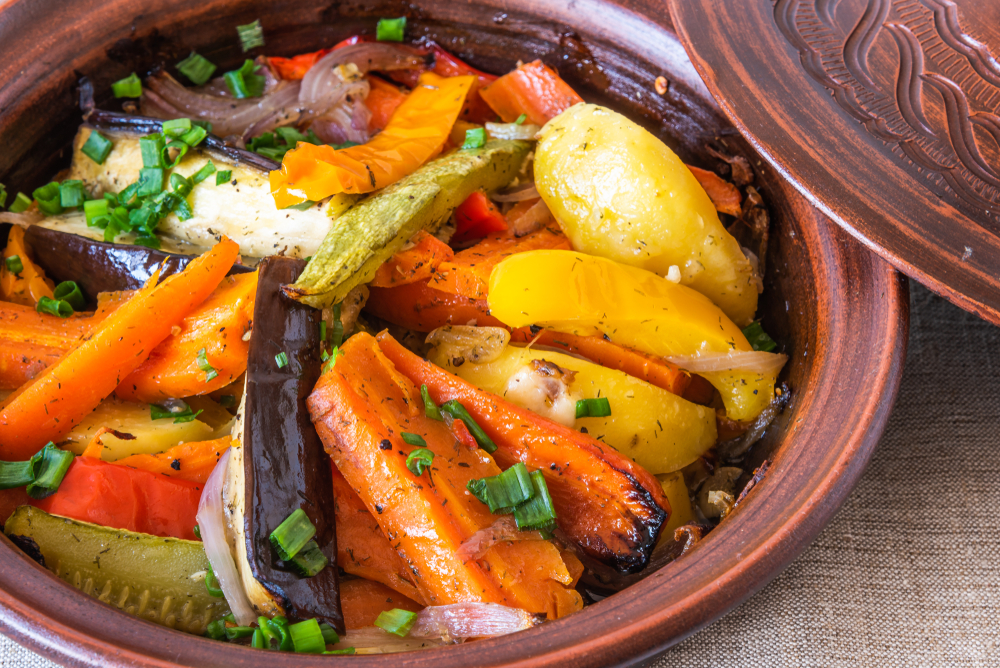
Vegetarian tagines explode with flavor, thanks to spices like cumin, coriander, cinnamon, and saffron. Savoring one in Morocco means savoring culinary history, reflecting the country's cultural heritage and culinary creativity.
Vegetarian Couscous
Moroccan vegetarian couscous, deeply rooted in tradition and history, takes on various delightful forms throughout the seasons. This versatile dish reflects Morocco's rich culinary heritage, with different regions showcasing their unique twist on it.
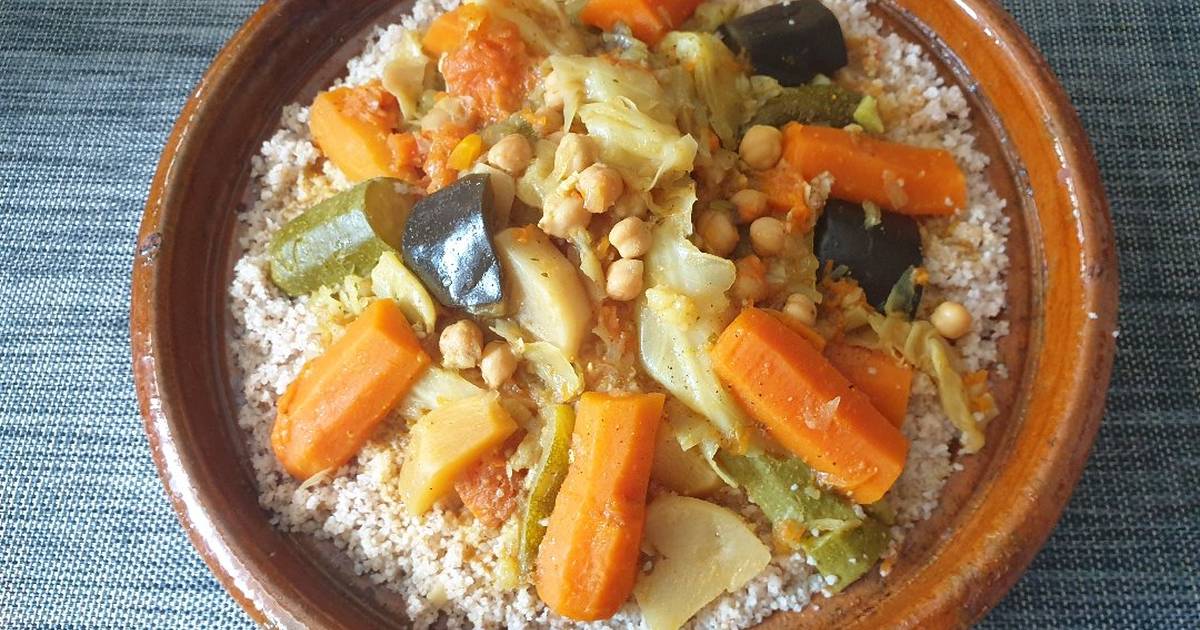
During the spring, as nature awakens, couscous recipes burst with vibrant green vegetables, paying homage to the season's freshness. Moroccan green couscous is a delectable specialty typically crafted from a medley of fresh spring vegetables. This vibrant dish often features fava beans, artichokes, green zucchini, and gourd, celebrating the season's bounty. As the Moroccan weekend tradition goes, couscous is a cherished highlight of the Friday lunch table. Families gather around to enjoy this flavorful, communal meal, continuing a long-standing tradition that weaves through the fabric of Moroccan culture. It's a culinary ode to the land's rich produce and the art of transforming humble vegetables into a delightful feast for the senses.
Most Moroccan restaurants cater to vegetarians by offering vegetarian couscous, the same as regular couscous but without meat. However, vegans need to inquire about the use of butter in the dish, as couscous is traditionally made with butter.
Harira Soup
Harira, a Moroccan soup, is a cherished symbol of unity and tradition during the holy month of Ramadan. Its history is deeply rooted in Moroccan culture, stretching back through the centuries. This hearty dish, brimming with plant-based proteins from ingredients like lentils and chickpeas, has evolved over time, reflecting the diverse culinary influences that have shaped Moroccan cuisine. The spices used in harira, such as cumin, coriander, and saffron, demonstrate the historical connections to trade routes and the blending of flavors from various regions.
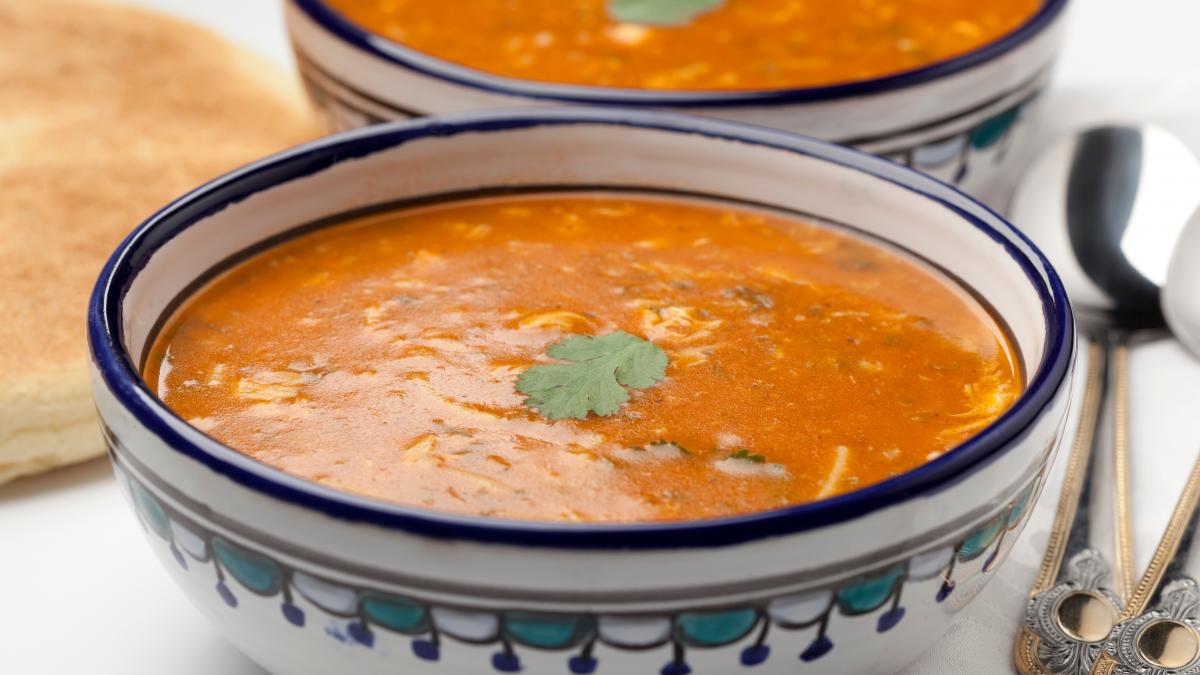
While harira is a staple of Ramadan, its delicious and nourishing qualities make it a beloved dish year-round in Moroccan households. Whether enjoyed during special occasions or as a comforting meal on any day, harira stands as a testament to Moroccan culinary tradition, offering a taste of Morocco's rich history and cultural heritage.
Briouats
Moroccan Briouats, crispy pastry typically made with Warqa, a type of phillo dough, filled with a mixture of minced meat and spices, have a vegetarian and vegan twist that caters to diverse tastes. These savory treats offer a delightful fusion of traditional flavors and modern dietary preferences. Vegetarian Briouates often feature potatoes and soft cheese mixture, while vegan versions include briouate made of medley of vegetables like carrots, potatoes, and peas, seasoned with aromatic Moroccan spices. Whether you're adhering to a plant-based lifestyle or simply exploring new flavors, these Briouates are a mouthwatering embodiment of Morocco's culinary versatility, bridging tradition and contemporary preferences with each delectable bite.
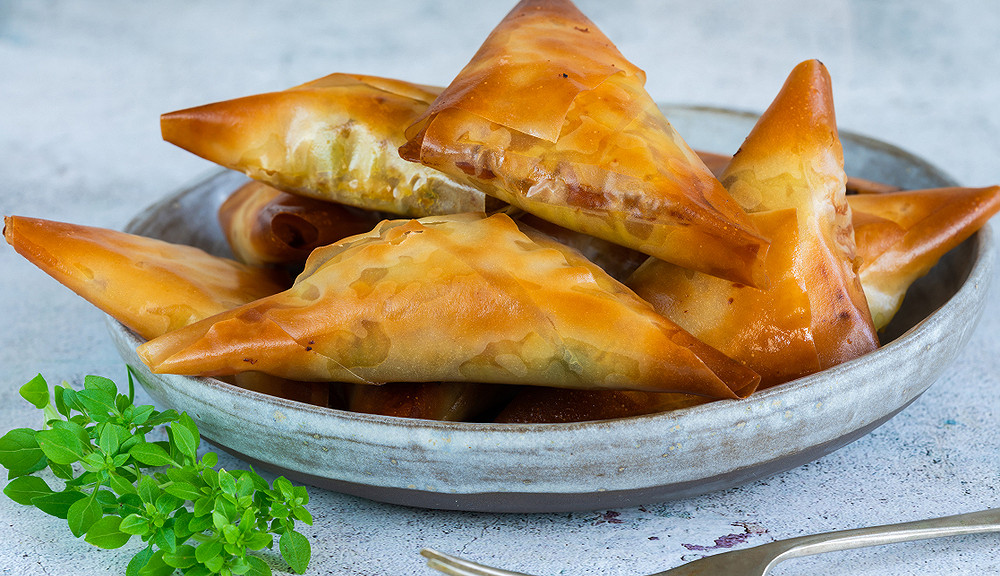
Fire Roasted Veggie
Moroccan roasted lamb may be famous, but roasted vegetables, such as tomatoes, onions, peppers and eggplant, can be prepared using the same slow-roasting method, offering a delectable vegan alternative. Fire-roasting vegetables is a culinary art form that elevates the humblest ingredients to exquisite heights.

One delectable dish that emerges from this tradition is the roasted pepper and tomato salad. Vibrant red and green bell peppers are charred over an open flame until their skins blister and blacken, imparting a smoky essence. Paired with plump, juicy tomatoes and drizzled with extra-virgin olive oil, this salad bursts with flavors that dance on your taste buds. Moroccan cuisine's mastery of fire-roasted vegetables transforms ordinary produce into extraordinary dishes, showcasing the country's commitment to crafting complex and unforgettable flavors from simple, seasonal ingredients.
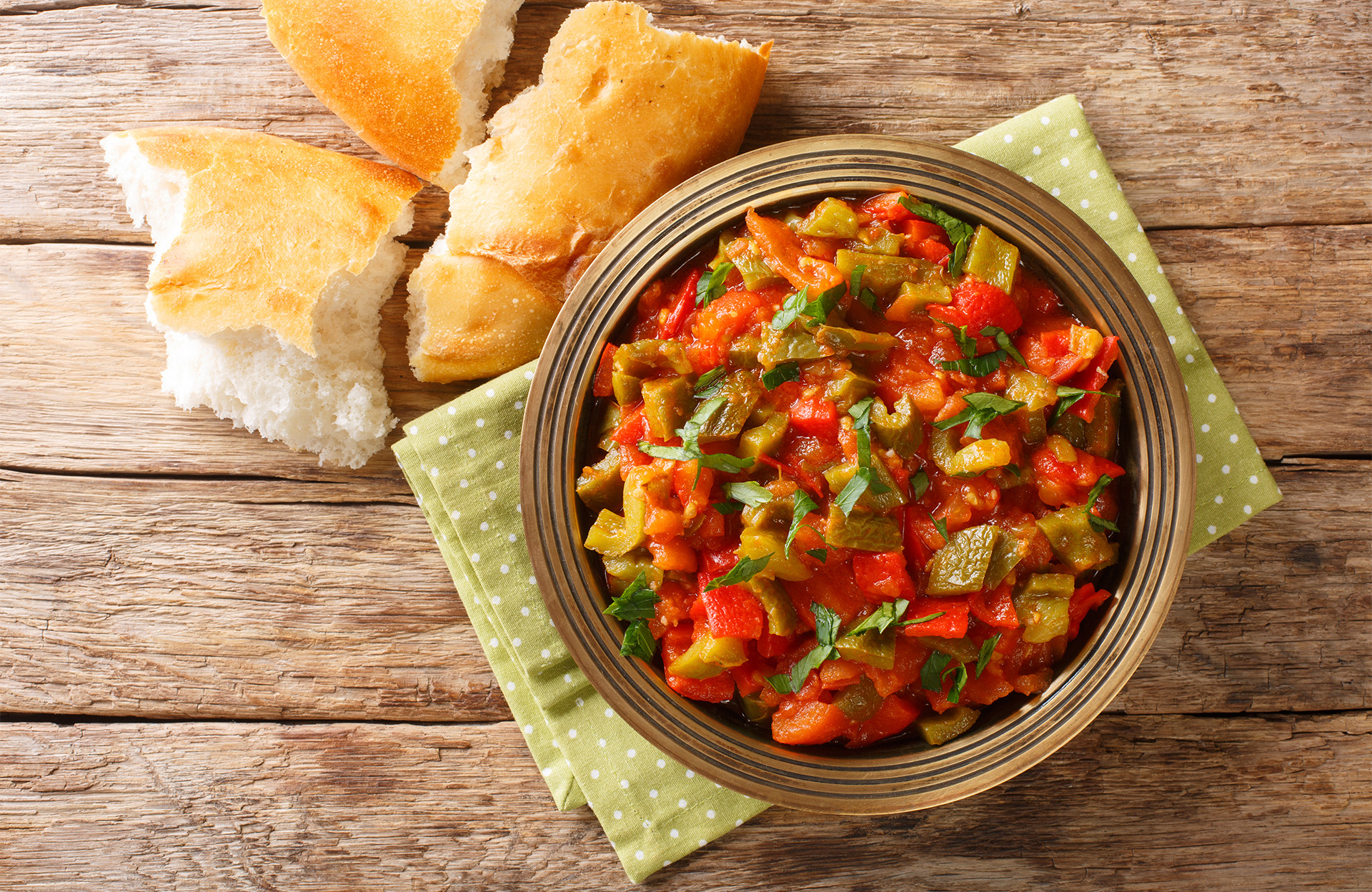
Moroccan Appetizers
In Moroccan dining, the journey begins with a delightful array of appetizers, setting the stage for a feast of flavors. Among these appetizers, Zaalouk, Bakoula, and Taktouka take center stage, weaving a tale of culinary tradition and innovation.
Zaalouk, with its smoky allure, is a treasured Moroccan appetizer that traces its roots to the heart of North African cuisine. Crafted from roasted eggplant and tomatoes, this dish reflects the Moroccan penchant for deep, earthy flavors. Spices like cumin, coriander, paprika, and garlic are masterfully blended to create a medley that delights the senses.
Bakoula, a verdant masterpiece, pays homage to the country's bountiful harvests of purslane. Prepared with a keen sense of balance, it harmonizes the natural earthiness of greens with lively spices such as cumin, paprika, and preserved lemon. With every bite, you savor the Moroccan landscape's bounty.
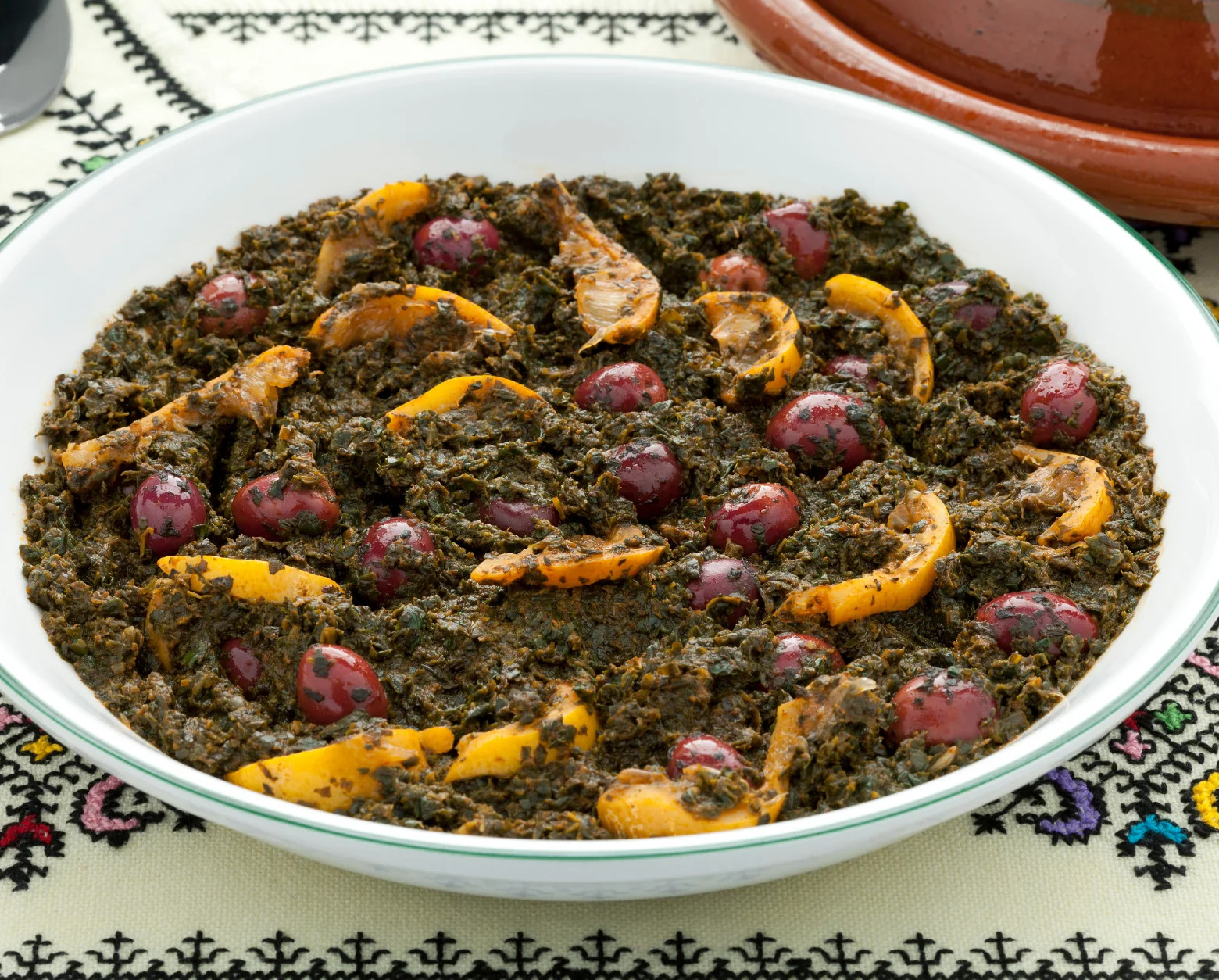
Taktouka, an emblem of Moroccan zest, captures the fiery spirit of roasted green bell peppers and tomatoes. Cumin, paprika, and garlic form a symphony of flavors that embodies the vibrant culture of Morocco.
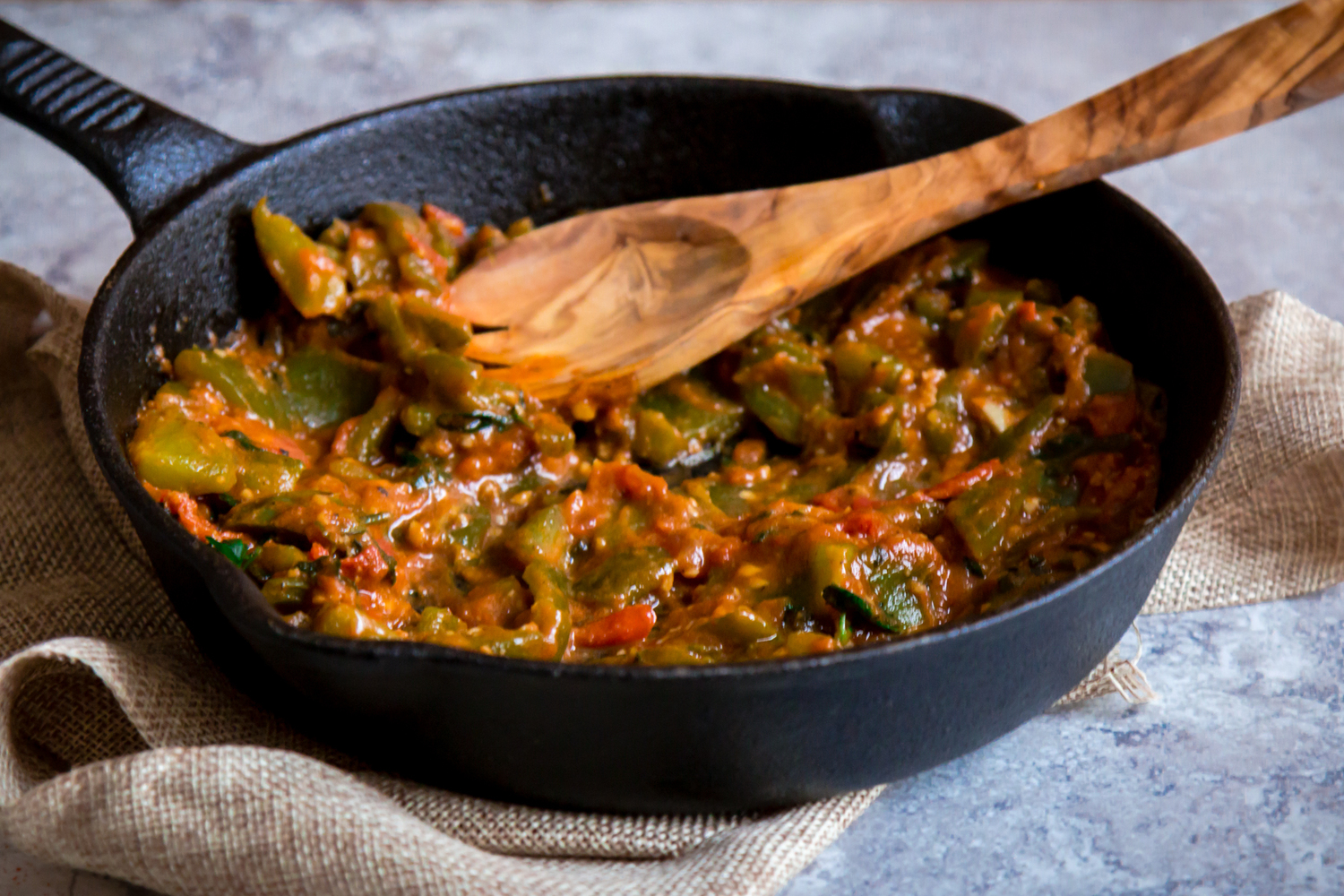
Tayb O'Hari
In Morocco, the streets come alive with an array of tantalizing street food offerings, and among the stars of this culinary scene is Tayb O'hari. This delectable dish revolves around humble chickpeas but transforms them into a flavorful, satisfying street food that captures the essence of Moroccan snacking.
Tayb O'hari is a celebration of simplicity and taste. It consists of chickpeas cooked to tender perfection and then lovingly seasoned with an array of Moroccan spices. These fragrant spices infuse the chickpeas with a rich, aromatic flavor that makes each bite a burst of delight. Some common additions include cumin, paprika, and garlic, which contribute to the dish's irresistible allure.
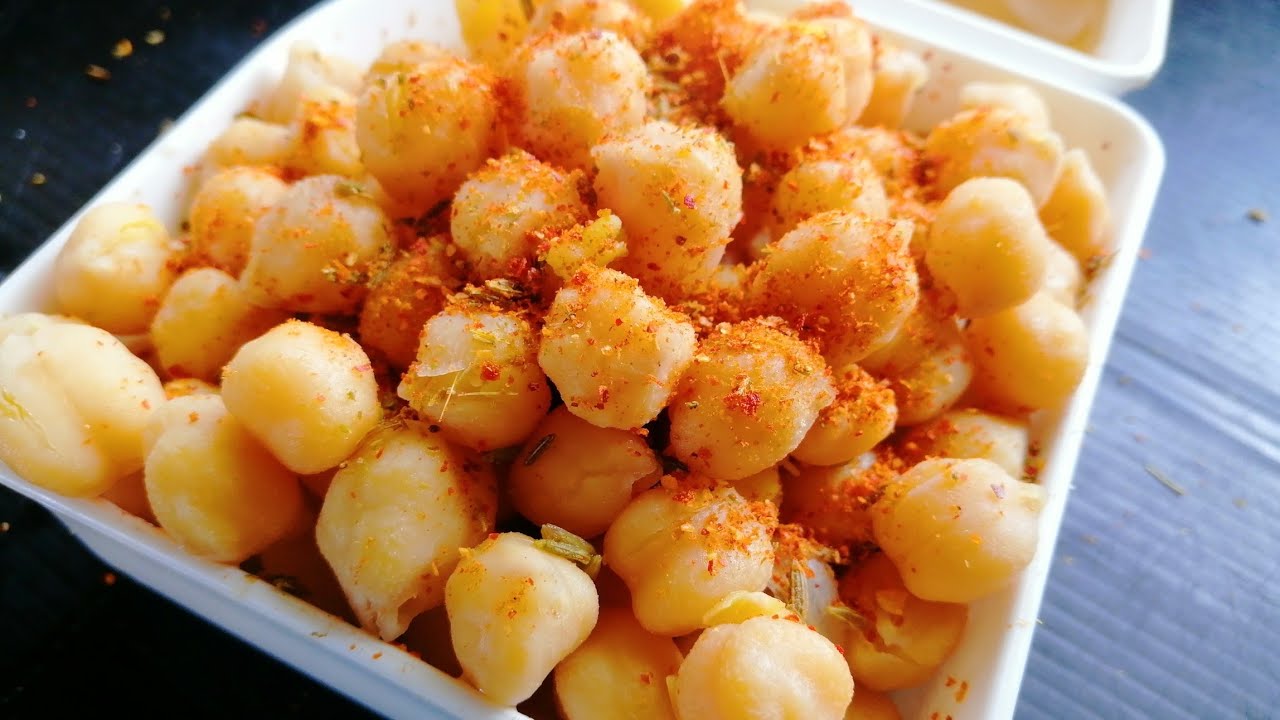
What makes Tayb O'hari particularly appealing is its versatility. You can find variations of this street food across Morocco, with regional twists that add to its charm. Some vendors may add a drizzle of olive oil for an extra layer of richness, while others might include a hint of lemon juice to enhance the dish's vibrancy.
One of the best aspects of Tayb O'hari is its accessibility. You can encounter this delicious street food in bustling markets, quiet alleys, and practically every corner of Moroccan cities and towns. It serves as a testament to Moroccan street food culture, where simplicity and quality ingredients come together to create an unforgettable snacking experience.
Laadess:
Originating from the heart of Morocco, Laadess is a simple yet flavorful dish that is a favorite among Moroccans, enjoyed by people from all walks of life. When dining in Moroccan restaurants, you'll discover that Laadess is a common appetizer. This delightful creation revolves around lentils, a staple in Moroccan cuisine, cooked to perfection with a blend of aromatic spices.
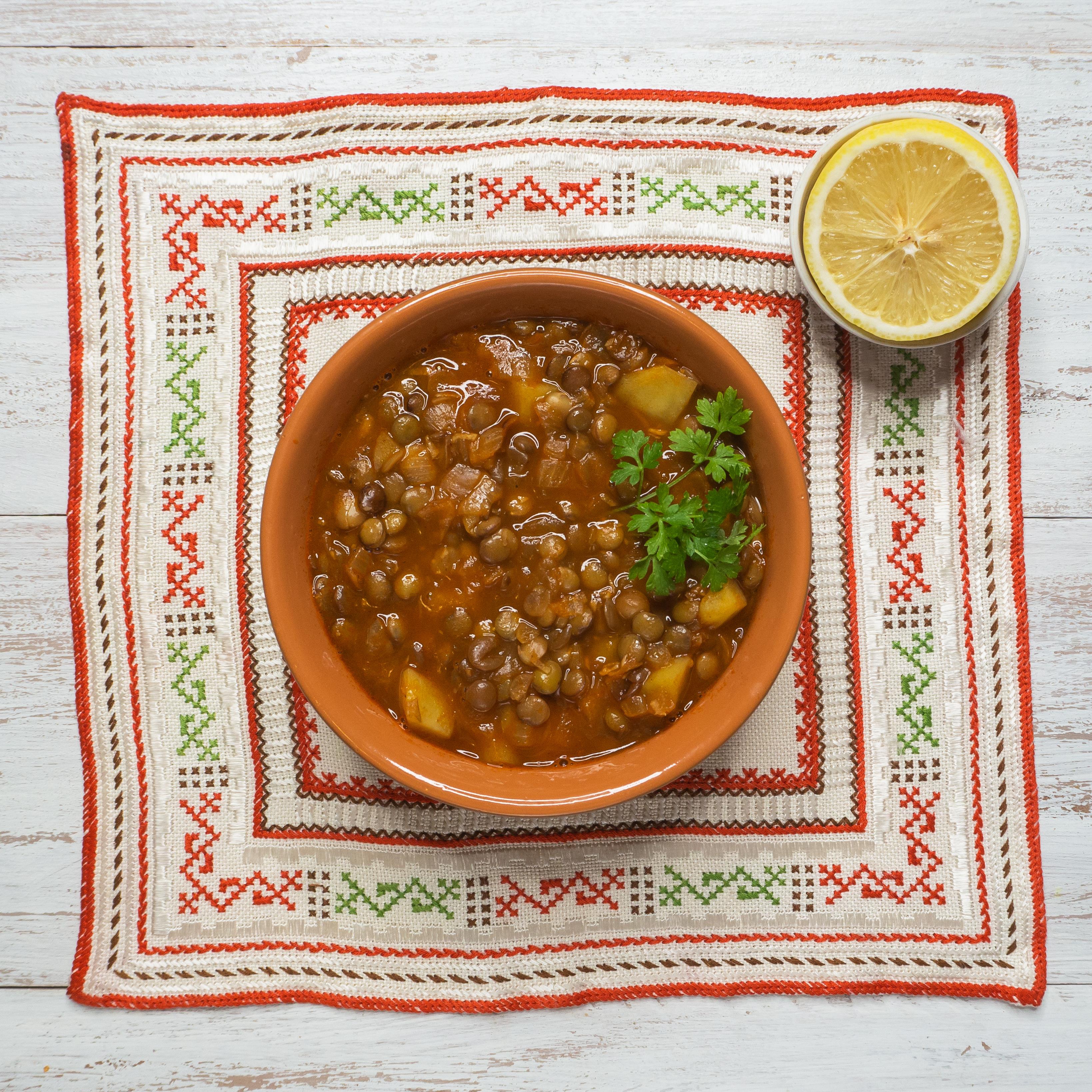
Laadess is a harmonious balance of earthy lentils, subtle spices, and a hint of smokiness, creating a flavorful experience. It's customarily enjoyed with freshly baked bread, and a drizzle of lemon adds a zesty touch, enhancing the overall taste. The dish is known for its heartiness and nourishing qualities, making it a popular choice during the colder months. Whether enjoyed as a hearty soup or a wholesome stew, Laadess embodies the warmth and richness of Moroccan comfort food, making it an excellent option for those following a plant-based diet.
Foule M'chermel
Foule M'chermel, cherished throughout Morocco, is a vegan and vegetarian culinary delight that proudly carries the nation's culinary legacy. This hearty stew made with fava beans as its main ingredient, slow-cooked to perfection with a harmonious infusion of aromatic spices like cumin, coriander, and paprika, along with garlic and fragrant herbs like parsley and cilantro. What sets it apart is the distinctive tanginess imparted by preserved lemons, elevating the dish to a new level of flavor. This Moroccan gem is more than just a nutritious meal; it's a testament to the country's rich culinary history and unwavering creativity, appealing to all palates.
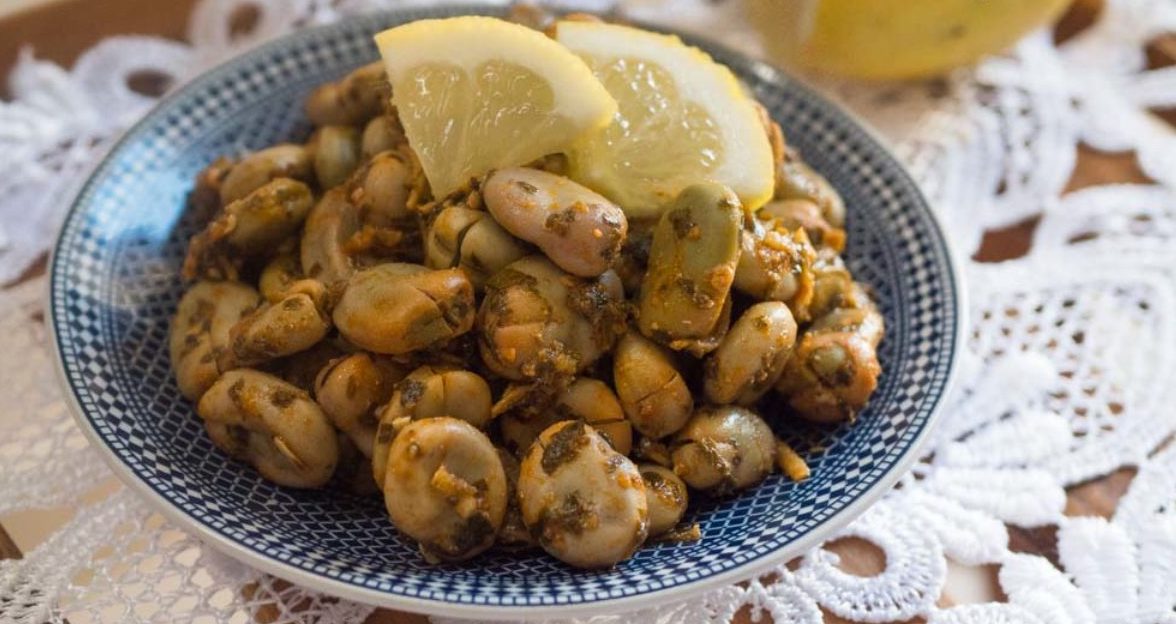
Loubia
Loubia, a beloved Moroccan dish, is a nutritious choice for vegans and vegetarians. It's a stew featuring white beans, as the main ingredient, in a flavorful sauce made with tomatoes, paprika, cumin, and garlic. This dish has a rich history in Moroccan cuisine and offers a satisfying balance of savory and tangy flavors. Toped with some olive oil, this dish is usually consumed with bread. Loubia has been enjoyed for generations, showcasing the resourcefulness of Moroccan cooks who transformed simple ingredients into a flavorful masterpiece.
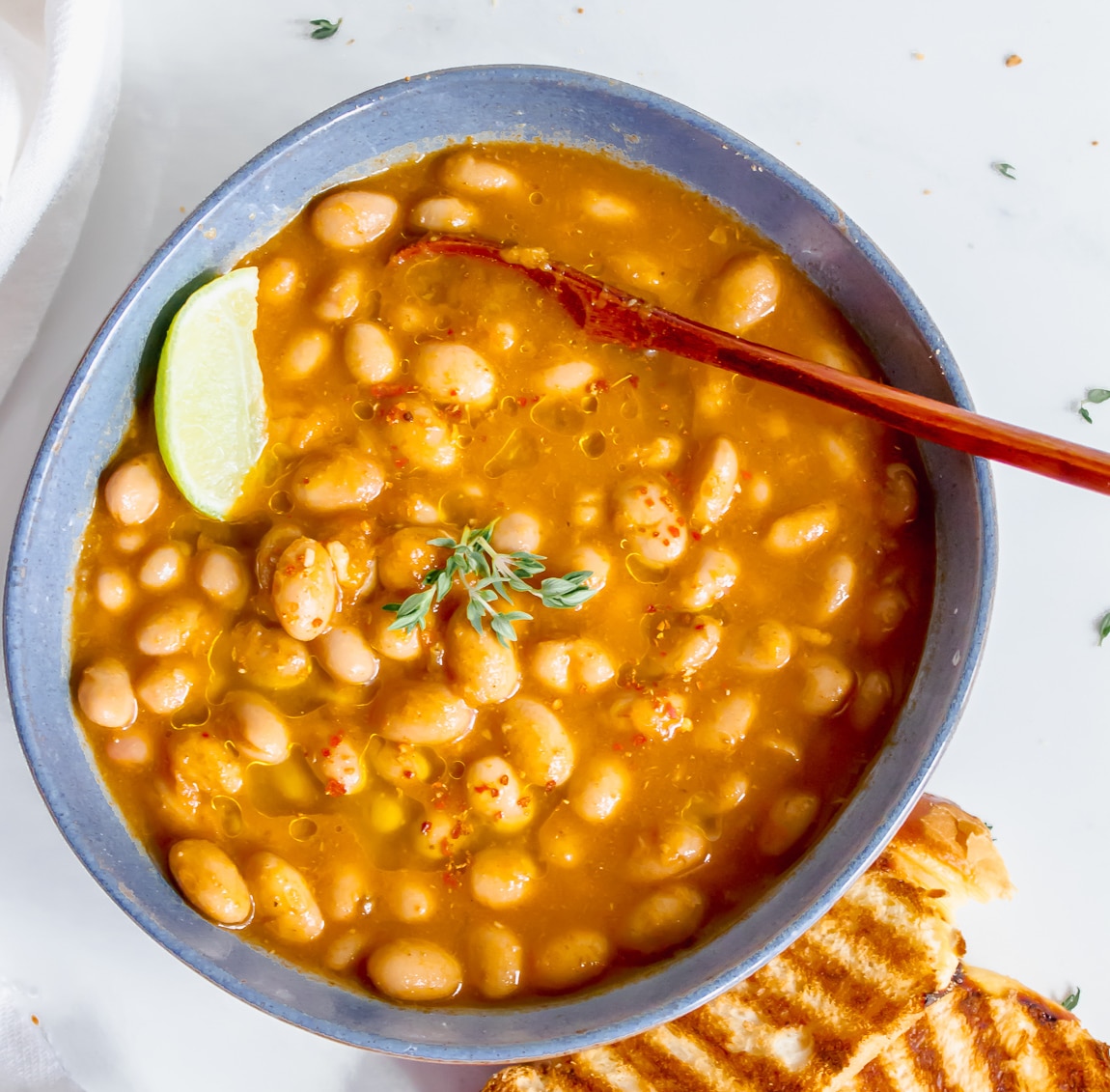
Foule Gnawa
Foule Gnawa, a delightful Moroccan dish, offers a nutritious option for vegans and vegetarians. This dish features fava beans in a delectable sauce made with cumin, garlic, and olive oil. Its roots can be traced back to Morocco's culinary heritage, and it boasts a flavorful combination of earthy and savory notes, making it a favorite among locals and visitors alike. Interestingly, Moroccan merchants once traveled to Ivory Coast and Senegal, where these beans were commonly grown. They brought the beans back to the region of Fes, where they flourished and became a popular ingredient in Moroccan cuisine
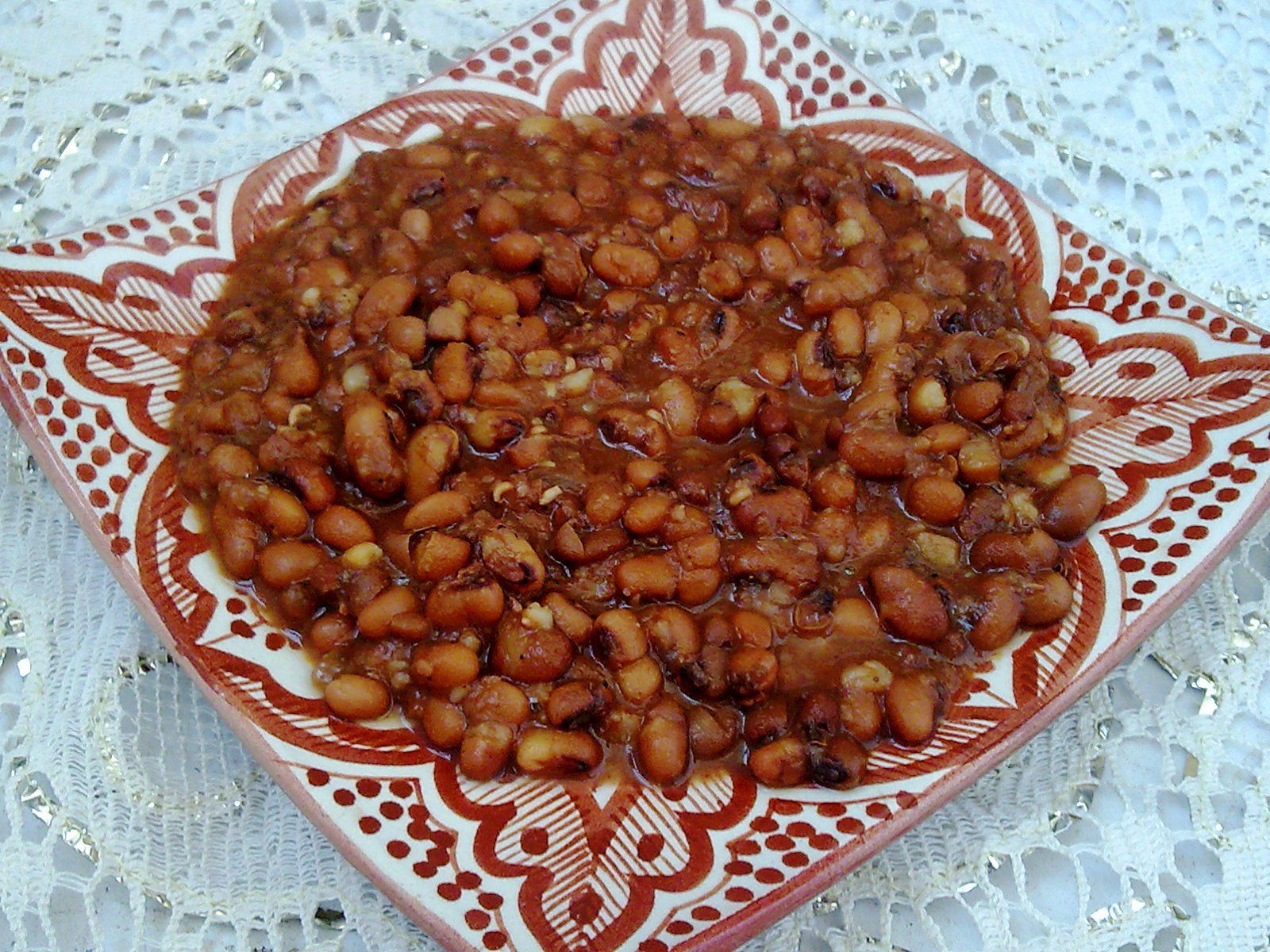
Khizou M'chermel
Khizou M'chermel, a Moroccan salad, showcases the delightful fusion of flavors and spices with carrots as its primary component. "Khizou" means carrots in Darija, the Moroccan dialect. This dish has deep roots in Moroccan culinary culture. Carrots are seasoned with a blend of spices, resulting in a harmonious blend of sweet and savory tastes. It's a versatile and beloved dish, often served as an appetizer or side dish, adding a burst of flavor to any Moroccan meal.

Sweets & Desserts:
Limoun Bel Kerfa
Moroccan Dessert Orange Slices with Cinnamon is a delightful dessert is a quintessential Moroccan treat, known for its simplicity and bold flavors. Slices of fresh oranges are elegantly arranged and sprinkled with a generous dusting of cinnamon, creating a vibrant and aromatic dish. The taste experience is a symphony of sweet citrus intermingled with the warm and earthy notes of cinnamon. It's a perfect ending to a Moroccan meal, offering a refreshing and palate-cleansing finish. This dessert is not only a testament to Morocco's love for both its locally grown produce and the art of flavor balance but also a testament to its ability to create something truly delicious from simple, natural ingredients.
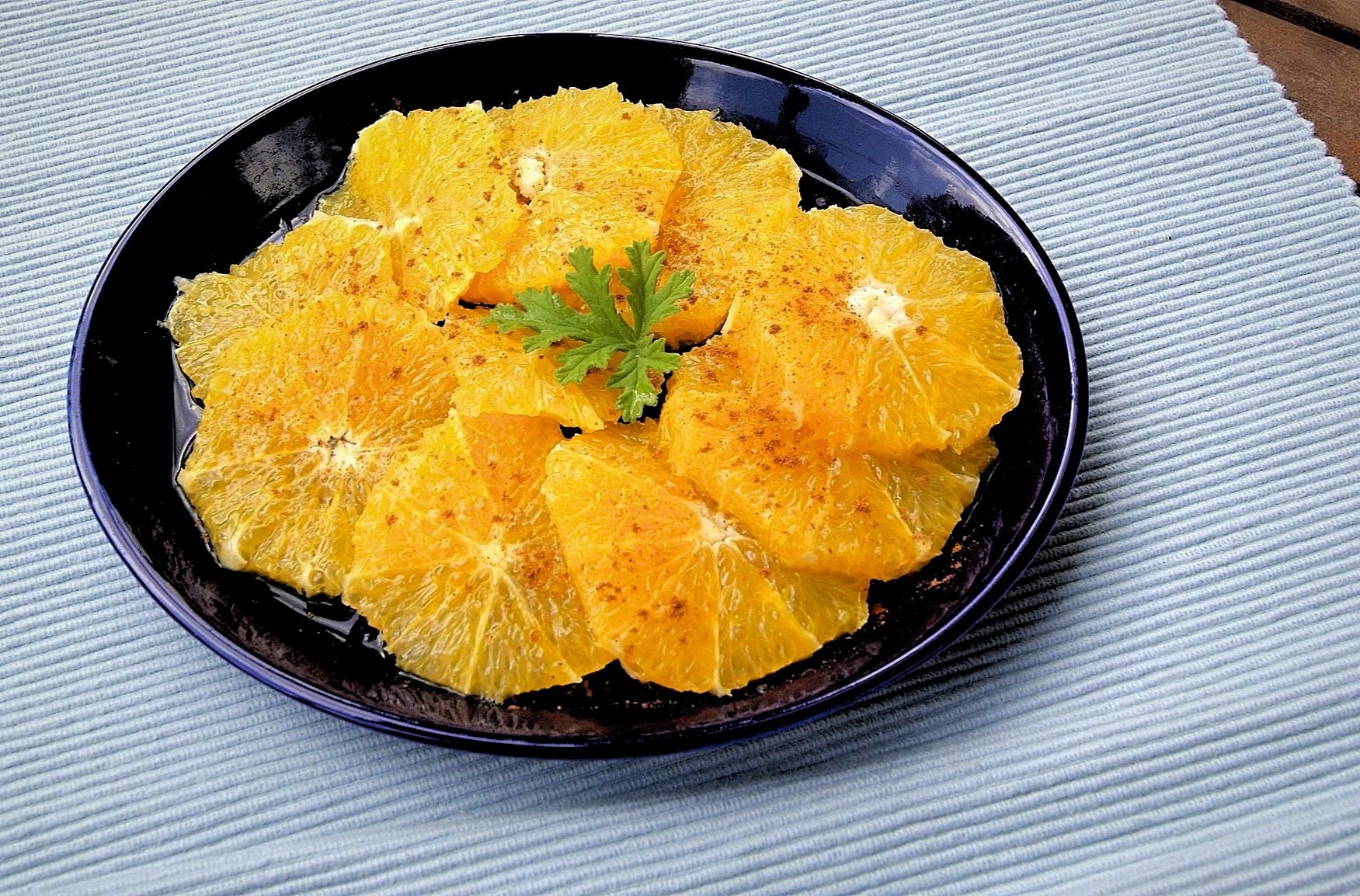
Ka'ab Ghzal
Moroccan sweets like Gazelle Horns can be made with dairy-free ingredients to satisfy your sweet tooth. Gazelle Horns are a Moroccan pastry delight, known for their crescent shape. These pastries feature a sweet almond paste filling flavored with orange blossom or rose water, wrapped in thin, flaky pastry layers. Prepared with care and regional variations, Gazelle Horns symbolize joy and hospitality in Moroccan culture, often enjoyed during special occasions like weddings and festivals. Experience the exquisite flavors and cultural significance of Gazelle Horns as you explore Morocco's rich culinary traditions.
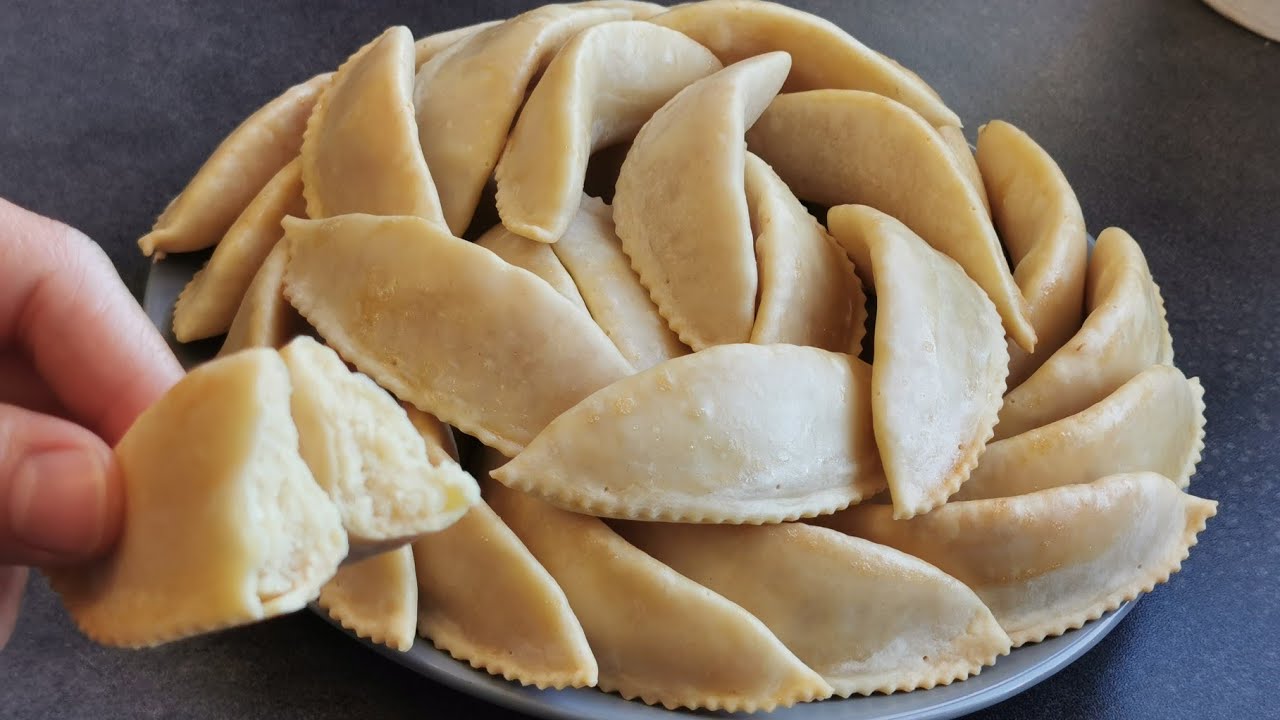
Chebakiya
Chebakiya is a popular Moroccan pastry with a unique, intricate design. It's made from a blend of flour, sesame seeds, anise seeds, and various spices, bound together with eggs and water. The dough is then rolled out, cut into diamond shapes, and deep-fried to a golden perfection. What sets Chebakiya apart is its sweet finish; after frying, the pastries are dipped in a fragrant honey and orange blossom water syrup. While it's vegetarian-friendly, it's important to note that honey & eggs are key components, making it not suitable for vegans. Chebakiya is often prepared during special occasions like Ramadan or weddings, reflecting the warmth and hospitality of Moroccan culture.
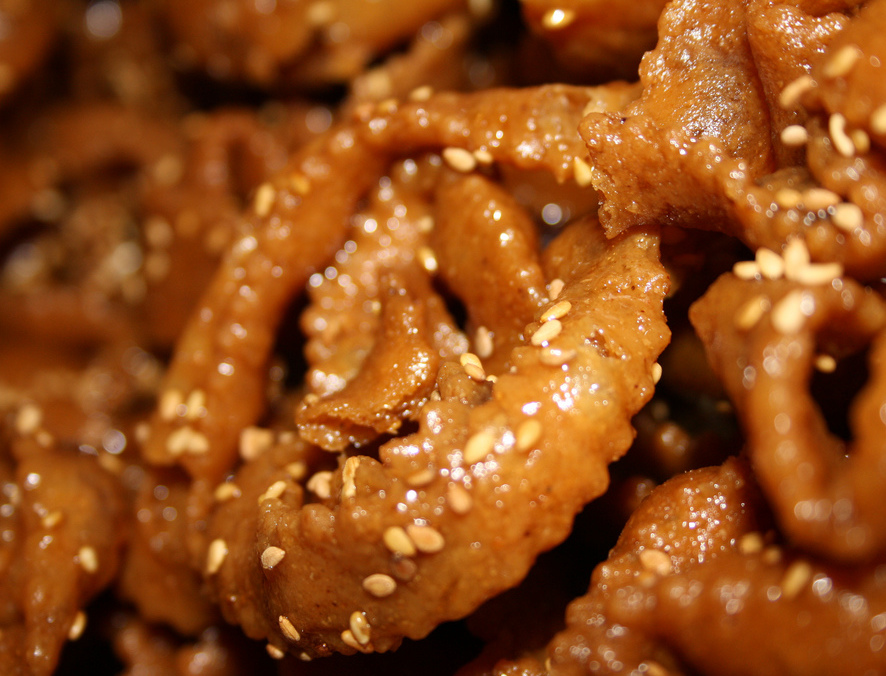
Morocco's culinary heritage embraces a world of vegetarian and vegan flavors, allowing all dietary preferences to savor the country's exquisite cuisine. Whether you're exploring traditional markets or dining in a local restaurant, you'll find an array of plant-based dishes that showcase Morocco's culinary creativity and cultural diversity

